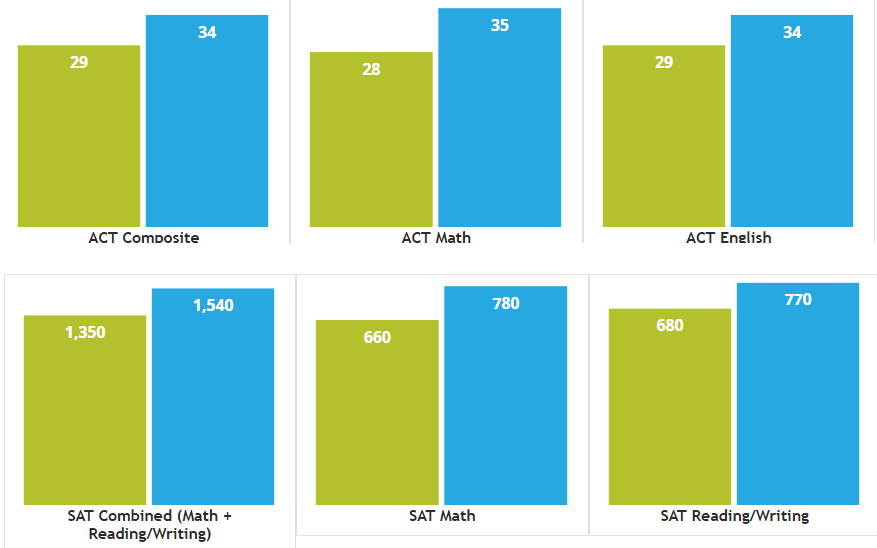During your high school years, you’ve likely been focused on your GPA and test scores alone. While you might be aware of some of your classmates’ scores, their grades (unless it’s a group project) tend to have little to do with yours. However, when it’s time to apply to college, other students’ GPAs and SAT/ACT results matter more than ever! That’s because these numbers can give you insight into your chances of getting accepted into your dream college.
So what is the average college GPA? And how does it affect your admission chances? And most importantly how do you compare your results? We answer these questions and more below!

What are the Average College GPA and SAT/ACT Scores?
When we talk about the average college GPA and test scores, we’re referring to the grades and scores of students who were accepted to that particular school in the last admission cycle. The average GPA, SAT, and ACT scores vary from college to college. It depends on how selective a school is.
For example, a school like Harvard or Stanford which historically have extremely low acceptance rates (3% for Harvard and 4% for Stanford in 2022), they’re looking for an extremely high GPA. Many students actually have above a 4.0, too. A mildly selective college, however, may be looking for anything above a 3.5.
Average Scores Vary by College Selectivity
When it comes to the SAT and ACT, extremely selective schools are also looking for top marks while non-selective schools will tend to be more lenient. However, it’s important to note that this is not a hard and fast rule. There will be some schools that are “fairly selective” yet have lower test score averages than schools that are “somewhat selective.” Here’s a quick glance at the average test scores among accepted students in 2023 among schools of varying selectivity:
- Harvard University is an extremely selective school (4%) and the average SAT Combined Score for accepted students was between 1500 and 1550. The average ACT Composite score was between 34 and 35.
- Oberlin College is a highly selective school (35%) and the average SAT Combined Score for accepted students was between 1370 and 1450. The average ACT Composite score was between 30 and 33.
- Southern Wesleyan University is a fairly selective school (51%) and the average SAT Combined Score for accepted students was between 1020 and 1090. The average ACT Composite score was between 19 and 21.
- The University of Alabama is a somewhat selective school (80%) and the average SAT Combined Score for accepted students was between 1140 and 1300. The average ACT Composite score was between 23 and 28.
- Wheaton College is a non-selective school (88.3%) and the average SAT Combined Score for accepted students was between 1280 and 1370. The average ACT Composite score was between 27 and 30.
How Can You Compare Your GPA, SAT Scores, and ACT Scores?
So since every school has a different average GPA and test results, how can you compare yours? College Raptor supplies this information for you. By entering your grades, SAT/ACT scores, and other information into our College Match tool, you can quickly compare your results to other students at various schools. The College Match tool tells you your chances of getting into a particular college, and how you stack up against students who were accepted in the last application cycle and it matches you with schools that fit with your interests, accomplishments, and grades.
Resources like this give you insight into your acceptance chances and help ensure you’re developing a healthy mix of safety, match, and reach schools when it comes time to complete your college applications. And if you still have plenty of time left to improve your grades and test scores, you have goals to shoot for!
How Much Do The Averages Matter?
You won’t automatically be ruled out and receive a rejection letter if you have a lower GPA or SAT/ACT result. But it can bring down an otherwise amazing college application. However, don’t let that discourage you from applying! These scores are the average – there are plenty of students who have GPA and test results lower and received acceptance letters.
Remember: the numbers don’t tell the whole story. While you should aim for the highest GPA and SAT/ACT results you can, you need a well-rounded college application if you want to get into a selective college or a reach school. Colleges look beyond these numbers.
For example, did you take all easy classes for that 4.0 or did you take difficult AP courses and earn a 3.5? Believe it or not, that 3.5 is going to look better to colleges!
Colleges are looking for students who push themselves, demonstrate leadership, participate in clubs and extracurricular activities, pursue their passions, write a strong application essay, and show their abilities beyond the classroom. So while GPAs and SAT/ACT scores do matter, they aren’t the end-all-be-all. If you have a strong rounded application but slightly lower grades, you could still get that coveted acceptance letter.





